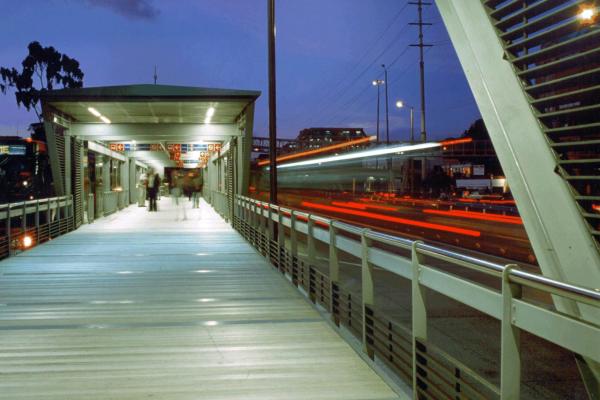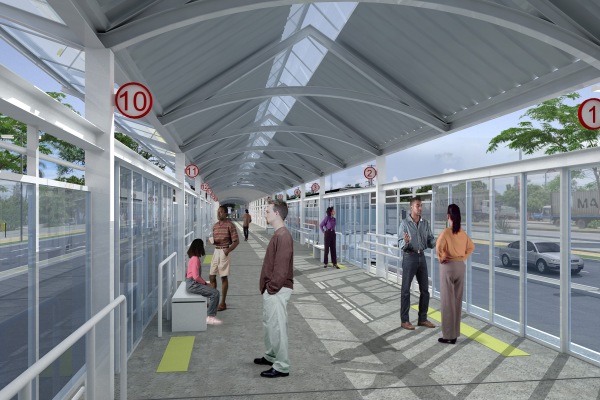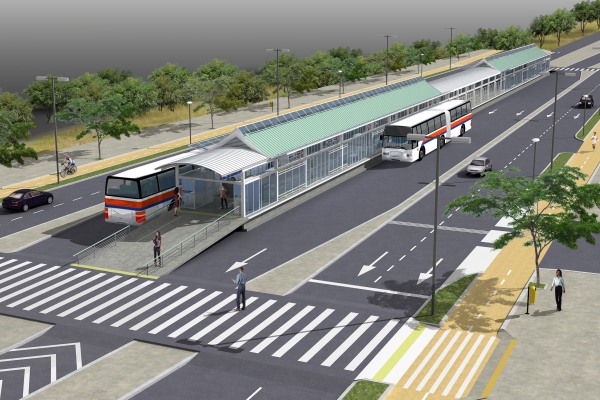Infrastructure in Brazil: Infrastructure, Mobility and Logistics Projects
Wagner Colombini Martins, President of Logit
Wagner Colombini Martins gives his assessment of the engineering consultancy sector within the areas of logistics, mobility and infrastructure in Brazil, and discusses investment opportunities in this segment. He also presents his company, Logit, mentioning some success cases, but also the challenges to be faced and his vision for the future.
Interview with Wagner Colombini Martins, President of Logit
What is your assessment of the engineering consultancy sector within the areas of logistics, mobility and infrastructure in Brazil?
Brazil today needs a lot of investment in terms of mobility. There has been a boom in vehicle sales as the population has increased purchasing power. People with lower incomes are now buying cars and so the cities are now very congested. Consequently there is a great necessity to invest in mass transportation.
The main differential of our company is innovation. We use state of the art technology in developing our projects and we develop really creative projects. Another factor that makes us stand out is our international experience which few of our competitors here have. We also have a very knowledgeable and capable team.
With respect to logistics there is a phenomenon that we call “the Brazil Cost” which relates to the high logistical costs for the products that we export. Brazil is a large commodity exporter and the lack of suitable infrastructure affects the final product costs and as a result the actual producers receive less money. We need to be much more efficient in order to be competitive on the international market. We need a lot of investment in railways, highways, ports and airports, etc.
Logistics and infrastructure are the same in many ways. However relating to logistics specifically, we need to improve our ITS: the use of information to make things flow better. This is the situation we are in now. Brazil is an emerging country and there are lots of areas that need investment. The country is growing but we have many bottlenecks.
Can you tell us about your company Logit?
Logit was founded 25 years ago. We started operating in an era when Brazil was experiencing hyperinflation and the economic situation was really tough. As the economy was in such bad shape here in Brazil we quickly started to work abroad, for example in Mexico and Colombia. The Brazilian real didn’t even exist when we first started business and the currency that we did have was much devaluated, thus we had to look for some hard currency abroad. We started on a few projects and we were successful. At the turn of the century, we participated in a project in Bogota called the TransMilenio; it was a Brazilian solution that Logit brought to Bogota and it was a huge success. After that project we started working on many other projects here and in various countries abroad.

Once hyperinflation was controlled by introducing the real, Brazil started to experience normal economic development and we started to see that the country had many problems in terms of logistics. Beforehand, we used to have financial logistic problems and now we have physical logistic problems. We saw that there were many possibilities for working in improving logistics and we started working on various projects in the area of macro-logistics and mobility. We have been working in the area of mobility for many years but now especially after the recent manifestations, improved infrastructure and mobility is at the top of the agenda here in Brazil. There is a lot of investment that is being channelled into these areas, one example that we have worked on is the concession program for the highway for the federal government. We developed all of the technical aspects for the project and it was a successful case; many private companies are now going to operate new roadways. This kind of thing is going to happen more and more. We need private investors to come and help with the infrastructure and mobility sectors through concessions or PPPs. The government doesn´t have the money to do everything. We need private investors to come with credible projects.
Can you tell us about your main clients and successful cases here in Brazil?
One successful case that we have worked on is the mobility project for Belo Horizonte. Our client for this project was the municipal council. We suggested for their mobility plan that they use a big BRT program and it is now being implemented. Another example is our work in Rio de Janeiro: we are helping the city with the BRTs that are being implemented there.
The TransOeste is already operating and is a huge success. The TransCarioca which is a peripheral corridor that connects Barra to Galeão is going to be inaugurated soon. This system is going to integrate all of the metro and railway lines and will greatly improve the mobility in that area. We have been working with the government and the city council and also with the private operators to help them become more efficient in organising and running the BRTs, for example in areas such as deciding on the services that are offered as well as the fleet that is required to meet the demand.

In the past we have also worked with the metro and train systems in Rio and we have also worked with the Porto Maravilha project by analysing the impact of the project on traffic and circulation. This project is going to be an amazing development for the future. It is very rare for a city to destroy a flyover on the grounds of improving urban space. Tunnels are being built in order to replace the flyover. We studied the entire traffic system to see how it will all work with the new system. We also studied what needs to be done during the implementation phases.
Another successful project that we have worked on here in Sao Paulo was the PPP for the Metro Line 4. It was a huge success. We integrated a consortium with Unibanco and a law company. We structured the PPP and estimated the demand for this metro line. The demand here resulted very close to our estimations. This metro line is privately operated now and is a huge success.
The TransMilenio in Bogota was an amazing success. We were part of the team developing the TransMilenio. Logit brought the Brazilian expertise that we have gained from our experience in Sao Paulo and Curitiba regarding using buses for mass transportation systems. The system that we implemented in Bogota was totally unique and now it is being implemented here in Brazil in Rio de Janeiro, Belo Horizonte and in other cities. This system is a huge success because you have a BRT system carrying as many passengers as a Metro system but at a much reduced cost.
Today, you can see BRT systems being implemented in poorer countries like Tanzania for example, where we did the project for Dar Es Salaam. These countries would never be able to implement a metro system because they don’t have the money to do so but now they have world class bus projects that can carry as many passengers as a metro. In addition, the buses that they are most likely to use are going to be Brazilian. In South Africa, we worked on projects for Johannesburg and Cape Town and the buses for those projects were exported from Brazil.
Can you tell us a bit about the company´s philosophy and what makes you stand out from your competition?

The main differential of our company is innovation. We use state of the art technology in developing our projects and we develop really creative projects.
Another factor that makes us stand out is our international experience which few of our competitors here have. We also have a very knowledgeable and capable team. We are very strict in terms of our recruitment and it really pays off. We are closely linked to the university so that we can attract the best talent. We try to create a good working environment with a mixed team for developing our top quality projects.
What are the main challenges that your company faces?
One main challenge is regarding the uncertainty of what is going to happen next year in 2015. We are perhaps going to have some economic adjustments so we need to be prepared. Fortunately, we are working in an area that has a lot of demand so I don’t think we are going to be affected that much but we are obviously concerned. The challenge is managing the situation. We do have big projects happening and we are feeling confident.
We also need to ensure that as we grow, we maintain the quality of our projects. This is something that we are always considering. We have been successful so far and our growth has been very natural. We have been around for 25 years and perhaps in the next few years we are going to have a steeper growth. I am not sure about 2015 but I do think we are going to have plenty of projects in the future because infrastructure and mobility are top of the agenda in terms of investment.
What is your assessment of the investment opportunities in this sector here in Brazil?
I think the opportunities are huge. In terms of mobility there are mass transportation systems like metros, elevated tramways or BRTs that need private sector investment. There are also plenty of opportunities for PPPs. I think there is room for communication companies to come in, for example here in Sao Paulo, we had the Clean City program and there are lots of opportunities for publicising this campaign in the bus stops and the company that gets the concession to do the propaganda is responsible for maintaining the bus stops. We also have problems here with our sidewalks: it is difficult for the handicapped to get around and so this is another example of an opportunity for investment. An idea would be to have a PPP to renovate and maintain the sidewalks and place the cables that are currently above ground, under the sidewalk.
There are also opportunities in urban operations where one improves an area of a city in terms of investing in new buildings and infrastructure, etc., for example in Porto Maravilha. The companies that are investing in Porto Maravilha are building tunnels, highways and other infrastructure to help organise these urban issues and they are going to get their money back from their investment in real estate: buildings and offices.
There is also going to be a lot of investment in railways, highways, ports and airports. There is a large investment project put forward at the moment for the railways and we have a lot of foreign companies interested in developing our airports.
Brazil is a great country for investing in mobility and infrastructure. There are many possibilities and I think they will be available in the near future.
What about investment opportunities within your company itself? Are you looking for some kind of partnership?
We are always open to discussions. We have been helping international companies in looking for investments and in developing proposals for bids, etc. When we work abroad we always look for local partners and so when foreign investors come here they probably would like to have a local partner and we would be open to discussing the opportunities.
How do you see the future of the sector in two or three years´ time?

I think there will be a lot of growth. Brazil can´t cope with mobility without investment. The population is pressing the government on this issue. It has become a political matter. Mobility will need investment. We need investment in public transportation and it will happen on a large scale. The government has already announced a big pack for this; the projects have not been defined yet but there is money available. There are going to be lots of opportunities for private companies to participate in these areas. There are also going to be lots of opportunities in terms of infrastructure for logistics. As I mentioned earlier, there is a huge railway program that is going to be implemented and that is really needed in order to be more efficient and to cut down the costs of getting our agricultural products to our ports.
Where do you see the company in two or three years´ time? What would you like to have achieved?
We have experienced a speedy growth with an increased number of projects and our expectation is that this is going to continue over the next 5 years.
What advice would you give to an investor that is interested in coming to Brazil to invest in your sector?
I would say that the areas of mobility and infrastructure are both very good areas to invest in. Now that Brazil is not considered as one of the top countries to invest in, I think it is even more appropriate to invest here because previously I think people were overestimating Brazil and now I think they are underestimating it! There is a need for investment and Brazil today is a good place to invest: our legal framework is sound and investors are protected. Continue reading…
FAIR USE POLICY
This material (including media content) may not be published, broadcasted, rewritten, or redistributed. However, linking directly to the page (including the source, i.e. Marcopolis.net) is permitted and encouraged.